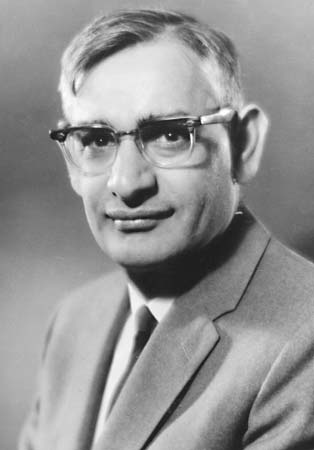Khorana, Har Gobind
American biochemist
born Jan. 9, 1922, Raipur, India
Indian-born American biochemist who shared the Nobel Prize in Physiology or Medicine in 1968 with Marshall W. Nirenberg (Nirenberg, Marshall Warren) and Robert W. Holley (Holley, Robert William) for research that helped to show how the nucleotides (nucleotide) in nucleic acids (nucleic acid), which carry the genetic code of the cell, control the cell's synthesis of proteins.
 Khorana was born into a poor family and attended Punjab University at Lahore and the University of Liverpool, England, on government scholarships. He obtained his Ph.D. at Liverpool in 1948. He began research on nucleic acids during a fellowship at the University of Cambridge (1951) under Sir Alexander Todd. He held fellowships and professorships in Switzerland at the Swiss Federal Institute of Technology, in Canada at the University of British Columbia (1952–59), and in the United States at the University of Wisconsin (1960–70). In 1966 Khorana became a naturalized citizen of the United States, and in 1971 he joined the faculty of the Massachusetts Institute of Technology, where he remained until he retired in 2007. In addition to the Nobel Prize, Khorana received the Albert Lasker Basic Medical Research Award (1968) and the National Medal of Science (1987).
Khorana was born into a poor family and attended Punjab University at Lahore and the University of Liverpool, England, on government scholarships. He obtained his Ph.D. at Liverpool in 1948. He began research on nucleic acids during a fellowship at the University of Cambridge (1951) under Sir Alexander Todd. He held fellowships and professorships in Switzerland at the Swiss Federal Institute of Technology, in Canada at the University of British Columbia (1952–59), and in the United States at the University of Wisconsin (1960–70). In 1966 Khorana became a naturalized citizen of the United States, and in 1971 he joined the faculty of the Massachusetts Institute of Technology, where he remained until he retired in 2007. In addition to the Nobel Prize, Khorana received the Albert Lasker Basic Medical Research Award (1968) and the National Medal of Science (1987).In the 1960s Khorana confirmed Nirenberg's findings that the way the four different types of nucleotides are arranged on the spiral “staircase” of the DNA molecule determines the chemical composition and function of a new cell. The 64 possible combinations of the nucleotides are read off along a strand of DNA as required to produce the desired amino acids, which are the building blocks of proteins. Khorana added details about which serial combinations of nucleotides form which specific amino acids. He also proved that the nucleotide code is always transmitted to the cell in groups of three, called codons. Khorana also determined that some of the codons prompt the cell to start or stop the manufacture of proteins. Khorana made another contribution to genetics in 1970, when he and his research team were able to synthesize the first artificial copy of a yeast gene. His later research explored the molecular mechanisms underlying the cell signaling pathways of vision in vertebrates. His studies were concerned primarily with the structure and function of rhodopsin, a light-sensitive protein found in the retina of the vertebrate eye. Khorana also investigated mutations in rhodopsin that are associated with retinitis pigmentosa, which causes night blindness.
- Simon Bolivar Buckner
- Simon Bolivar Buckner, Jr.
- Simon Bolivar, Jr. Buckner
- Simon Caboche
- Simon Cameron
- Simon, Claude
- Simon Cowell
- Simon Dach
- Simon de Colines
- Simon de, Earl Of Leicester Montfort
- Simon de Graaff
- Simon de Montfort
- Simon de Montfort, Earl Of Leicester
- Simone de Beauvoir
- Simone Martini
- Simon Episcopius
- Simone Signoret
- Simone Weil
- Simon Flexner
- Simon Foucher
- Simon Fraser
- Simon Fraser, 11th Lord Lovat
- Simon Fraser Lovat, 11th Lord
- Simon Gray
- Simon, Herbert A.